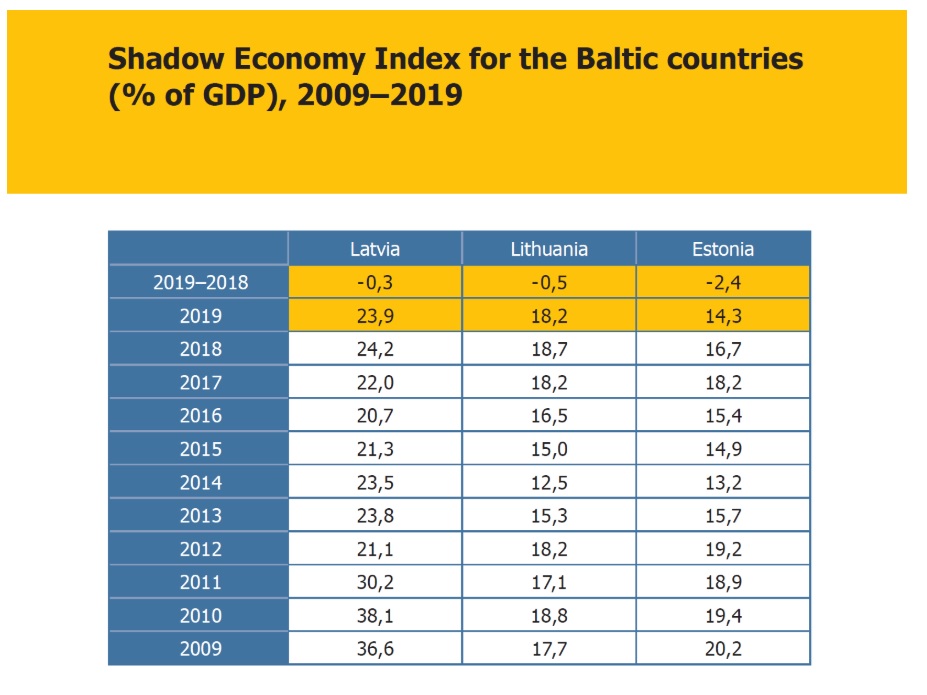In 2019 the shadow economy accounted for 23.9% of Gross Domestic Product, down just 0.3% on 2018's figure of 24.2% said Dr. Arnis Sauka of SSE Riga's Sustainable Business Center in an interview with LTV June 10.
Sauka pointed out that in 2009-2010 the share of the shadow economy was much larger at 36%-38% of GDP. In subsequent years the share improved substantially, but recently the rate of improvement has slowed.
“It is believed that as the economic situation improves, the shadow economy should shrink, as entrepreneurs are doing better and are more motivated thus to pay taxes. However, this may not be the case if, for example, businesses do not trust that tax money will be used properly, if there have been corruption or other scandals that have damaged public confidence in government, or if appropriate support measures have not been taken to improve the business environment or to limit the shadow economy," Sauka said ahead of a presentation of the research results.
"Unfortunately, we can conclude that in the previous 3-4 years, as the economy of Latvia has grown, the size of the shadow economy, in general, has not been reduced. The economic downturn caused by COVID-19 is likely to increase the growth of the shadow economy in both 2020 and 2021.”
According to the research, around 44% of the shadow economy in Latvia is accounted for by so-called "envelope payments" -- undeclared wages and untaxed cash-in-hand remuneration.
In 2019, the size of the shadow economy decreased more in neighboring countries - in Lithuania by 0.5%, but in Estonia by 2.4%, reaching 22% and 18.2% of GDP, respectively.

Research shows that in Latvia, on average, 22.3% of all income is paid in envelope salaries, but in Estonia and Lithuania this indicator is lower - 11% - 14%.
“According to the results of the study, there is an increasing gap between the level of envelope wages in Latvia as compared to that in other Baltic countries. Taking into account the expectable economic downturn in the coming years, action is urgently needed to deal with this problem in Latvia,” Sauka said.
The shadow economy in Latvia is most prevalent in the Riga region, in Zemgale, and in Kurzeme. In terms of sectors, the highest share of the shadow economy still comes from the construction sector.
According to the results of the study, in 2019 the general level of bribery in Latvia reached 8.1% (decrease by 0.2% compared to 2018); in Lithuania, 8.5% (decrease by 1.4%); and in Estonia, 3.9% (decrease by 1.1%).
Involvement or non-involvement in the activities of the shadow economy is influenced by several factors, and from the factors considered in the study, it is mostly related to dissatisfaction with the quality of business legislation and the State Revenue Service, followed by satisfaction with tax policy and state support for entrepreneurs.
“Regarding attitude, companies in the Baltic countries are still relatively satisfied with the operation of the State Revenue Service (SRS). In addition, in all three Baltic countries satisfaction with the SRS slightly increased in 2019: on a scale of 1-5, where 5 means very high satisfaction, in Latvia the satisfaction of entrepreneurs with the SRS was assessed at 3.5 (3.39 in 2018); in Lithuania, 3.7 (3.53 in 2018); and in Estonia, 3.8 (3.57 in 2018),” Sauka explained.
Satisfaction with the state tax policy has also increased in all three Baltic countries, but especially in Lithuania and Estonia. While in 2018 in Estonia, Lithuania, and Latvia entrepreneurs assessed their satisfaction with tax policy at 2.36, 2.85 and 2.41, respectively, in 2019 the assessments were 3.10, 3.10 and 2.60 (on a scale 1 to 5, where 5 means very high satisfaction). Satisfaction with the quality of business legislation has also slightly increased in all three Baltic countries, ranging from 3.01 to 3.35 in 2019. In turn, satisfaction with the state’s support for entrepreneurs in the Baltic countries in 2019 was approximately at the same level as in 2018 - in the range of 2.42-2.85.
“The results of the study indicate the need to continue reforms and other policy initiatives to reduce the shadow economy, both in Latvia and in the other two Baltic countries. It is especially important to implement such reforms, including reviewing the approach to limiting the size of the shadow economy, taking into account the economic downturn that is expected in the coming years,” Sauka concluded.






























